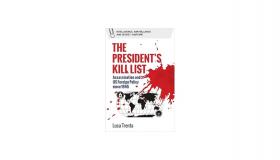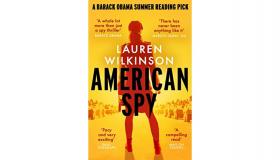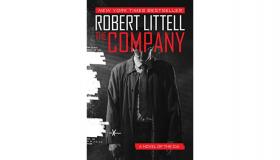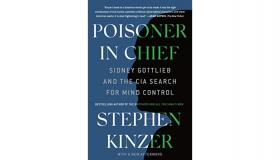
Breadcrumbs navigation
The best books on the CIA: real histories and not-so-fictitious stories
This article was originally published by Shepherd, a book discovery website where authors and experts share their favourite books. We recently embarked on a partnership with Shepherd to showcase our members' books, so we're pleased to share this first article. Look out for further articles by BISA members in the coming weeks. Try their bookshelf on international relations or politics to browse a wide range of recommended books.
Why am I passionate about this?
Green tracers in the sky over Baghdad. My first political memory is the start of the Gulf War in 1991. I remember writing angry essays criticizing the US decision to invade Iraq in 2003 for my high-school assignments. I have always been interested in US foreign policy and in how presidents make decisions. During my PhD, as I was working on a chapter on the origins of the Cuban Missile Crisis, I discovered the extent and–frankly–the madness of some of the plots the CIA and the White House concocted against Fidel Castro. More recently, the US government’s use of assassination and “targeted killings” have become the focus of my research.
I wrote...
The President's Kill List: Assassination and US Foreign Policy Since 1945
By Luca Trenta

What is my book about?
My book tells the controversial story of assassination in US foreign policy. From early experiments in assassination and mind control to the Trump Administration’s killing of Iranian General Qassem Soleimani, the book explores the methods, the language, and the politics surrounding assassinations and assassination attempts.
It showcases how the US government targeted leaders and officials both directly, from developing poison to bombings and indirectly, by providing support to local actors. For much of the Cold War, assassination happened behind a veil of euphemisms, special groups with dull names, and presidential deniability. With the establishment of a ban on assassination in the 1970s, the US government had to justify internally and publicly its activities as something that looked like assassination but was something else.
The books I picked & why
American Spy

Why did I love this book?
Spies, lies, love, coups, what more do you want? In the book we encounter Marie Mitchell, now under threat of assassination, but previously a CIA spy who had fallen in love with–and collaborated in the downfall of–Thomas Sankara.
For Marie, the transition to the CIA is a way of escaping the stifling and misogynistic FBI of the 1980s. For the CIA, a black, attractive woman is ideal to snoop in and undermine a charismatic leader. The book, told by Marie as a letter to her children, moves back and forward between her spying missions and her (self)exile in Martinique.
It is fast-paced, realistic, and able to portray the daring aspects, the bureaucratic obstacles, and the moral compromises of spying for the CIA.
The Company: A Novel of the CIA

Why did I love this book?
The book's subheading reads A Novel of the CIA. I would go further. This is ‘The Novel of the CIA,’ especially of the CIA between its founding and the early 1990s. It is a masterful combination of real and fictitious spies and covert operations.
The portrayal is so precise, the blending so seamless, that I found myself–and yes, I am supposedly an expert on this–double-checking whether certain operations had taken place. Nonfiction books on the CIA are one of my favorite things, but here, you experience the characters from much closer. I felt their desperation when operations collapsed, or agents were betrayed, or their elation after the rarer successes.
I felt the smoke in James Angleton’s room as he hunted for the missing mole; whether he managed to capture the mole or not will be for you to discover, but the book will stay with you both literally (it’s long) and emotionally for a very long time.
Poisoner in Chief: Sidney Gottlieb and the CIA Search for Mind Control

Why did I love this book?
Now for some facts, although they will appear stranger than the fiction above. Born with a club foot and unable to join the army during World War II, Sydney Gottlieb became a leading covert warrior. For years, he oversaw some of the CIA’s most controversial programs. He developed poisons to kill foreign leaders and officials, and he worked in MKULTRA, the Agency’s program for mind control, which included the use of LSD, drugs, isolation, and other invasive experiments and forms of torture on witting and unwitting subjects.
The book is a detailed, if harrowing, history. It is even more impressive as most of the documents on these programs were destroyed by Gottlieb himself in 1973, under orders from the CIA Director at the time, Richard Helms.
Legacy of Ashes: The History of the CIA

Why did I love this book?
Is this the best book on the Agency, probably not. Is this a full history? No again. But it is the first book I bought and read on the Agency, and it kickstarted my passion for secrecy and covert action. I found the account, perhaps, a bit biased. There aren’t only failures in the history of the CIA, but the failures sure are many, and Weiner portrays them with accuracy and flair. The degree of access to participants is also exceptional, and I was drawn immediately into the Agency schemes.
How many failures can an Agency take? How can we reconcile secrecy with a democratic society? After reading the book, I felt like I did not have all the answers, but I certainly wanted to find out more. The book’s story ended in 2007, but a sequel is coming in 2025.
Image by Fry1989 on Wikimedia Commons


